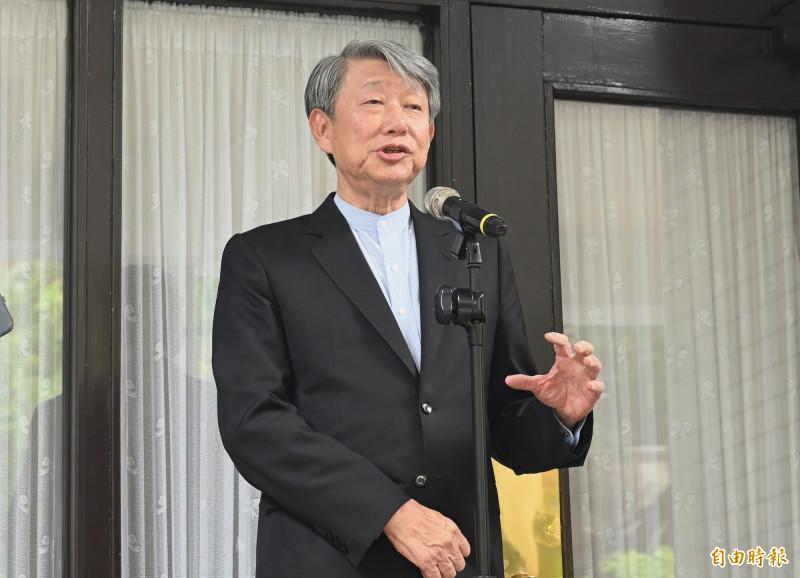Taiwan only expects a small impact from any tariffs imposed by the incoming government of US president-elect Donald Trump on semiconductor exports given their technological superiority, Minister of Economic Affairs J.W. Kuo (郭智輝) said today.
Home to the world's largest contract chipmaker, Taiwan Semiconductor Manufacturing Co (TSMC, 台積電), Taiwan is a key link in the global technology supply chain for companies such as Apple and Nvidia.
However, Taiwanese policymakers have warned new US tariffs against all countries from the incoming Trump administration could curb economic growth this year for the export-dependent economy.

Photo: Taipei Times file photo
Trump has pledged a blanket tariff of 10 percent on global imports into the US and a far higher 60 percent tariff on Chinese goods. In late November last year, he specifically pledged a 25 percent tariff on imports from Canada and Mexico when he takes office on Jan. 20.
Asked at a news conference about the impact on Taiwan's export orders of Trump's tariffs, Kuo said it would not much affect the chip sector.
"For our semiconductors and advanced processes, there is an advantage of technological leadership and that cannot be replaced, and so the impact will be small," he added.
Taiwan will also help companies relocate supply chains to the US as needed, away from where there might be high import tariffs, Kuo said.
"Now we see that we should be able to develop the aerospace supply chain industry in the US, and do some joining up with the US aerospace companies, so that some of Taiwan's aerospace research and development centers can be moved to there."
Taiwan will also set up an office in Japan in the first half of this year to help Taiwanese businesses invest there, and cooperate with the country on artificial intelligence and drones, he added.

Intel Corp chief executive officer Lip-Bu Tan (陳立武) is expected to meet with Taiwanese suppliers next month in conjunction with the opening of the Computex Taipei trade show, supply chain sources said on Monday. The visit, the first for Tan to Taiwan since assuming his new post last month, would be aimed at enhancing Intel’s ties with suppliers in Taiwan as he attempts to help turn around the struggling US chipmaker, the sources said. Tan is to hold a banquet to celebrate Intel’s 40-year presence in Taiwan before Computex opens on May 20 and invite dozens of Taiwanese suppliers to exchange views

Application-specific integrated circuit designer Faraday Technology Corp (智原) yesterday said that although revenue this quarter would decline 30 percent from last quarter, it retained its full-year forecast of revenue growth of 100 percent. The company attributed the quarterly drop to a slowdown in customers’ production of chips using Faraday’s advanced packaging technology. The company is still confident about its revenue growth this year, given its strong “design-win” — or the projects it won to help customers design their chips, Faraday president Steve Wang (王國雍) told an online earnings conference. “The design-win this year is better than we expected. We believe we will win

Chizuko Kimura has become the first female sushi chef in the world to win a Michelin star, fulfilling a promise she made to her dying husband to continue his legacy. The 54-year-old Japanese chef regained the Michelin star her late husband, Shunei Kimura, won three years ago for their Sushi Shunei restaurant in Paris. For Shunei Kimura, the star was a dream come true. However, the joy was short-lived. He died from cancer just three months later in June 2022. He was 65. The following year, the restaurant in the heart of Montmartre lost its star rating. Chizuko Kimura insisted that the new star is still down

While China’s leaders use their economic and political might to fight US President Donald Trump’s trade war “to the end,” its army of social media soldiers are embarking on a more humorous campaign online. Trump’s tariff blitz has seen Washington and Beijing impose eye-watering duties on imports from the other, fanning a standoff between the economic superpowers that has sparked global recession fears and sent markets into a tailspin. Trump says his policy is a response to years of being “ripped off” by other countries and aims to bring manufacturing to the US, forcing companies to employ US workers. However, China’s online warriors